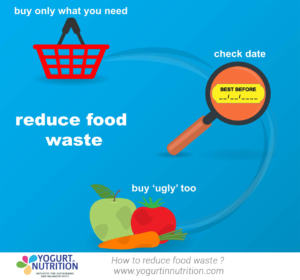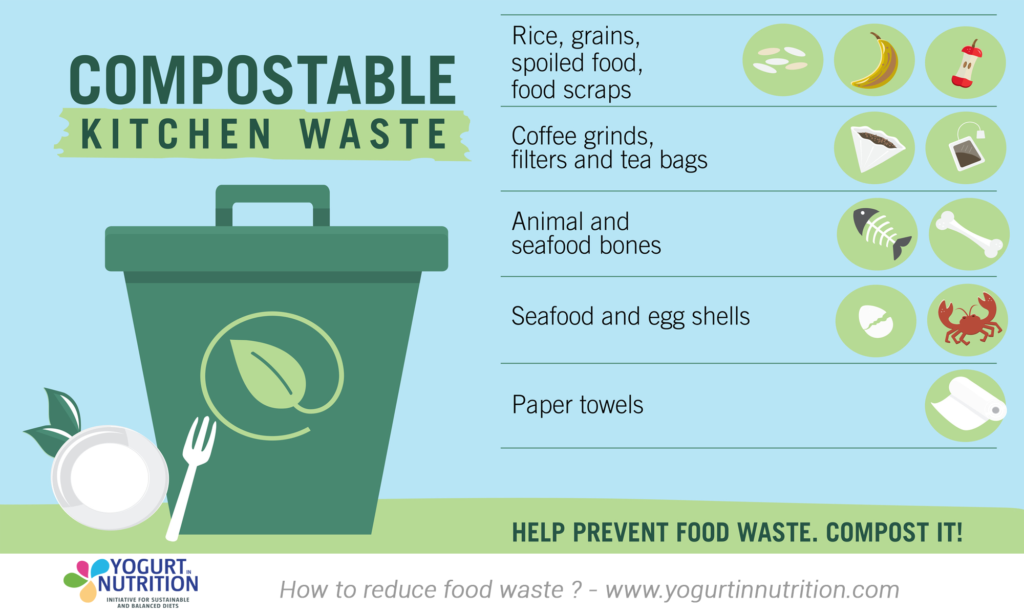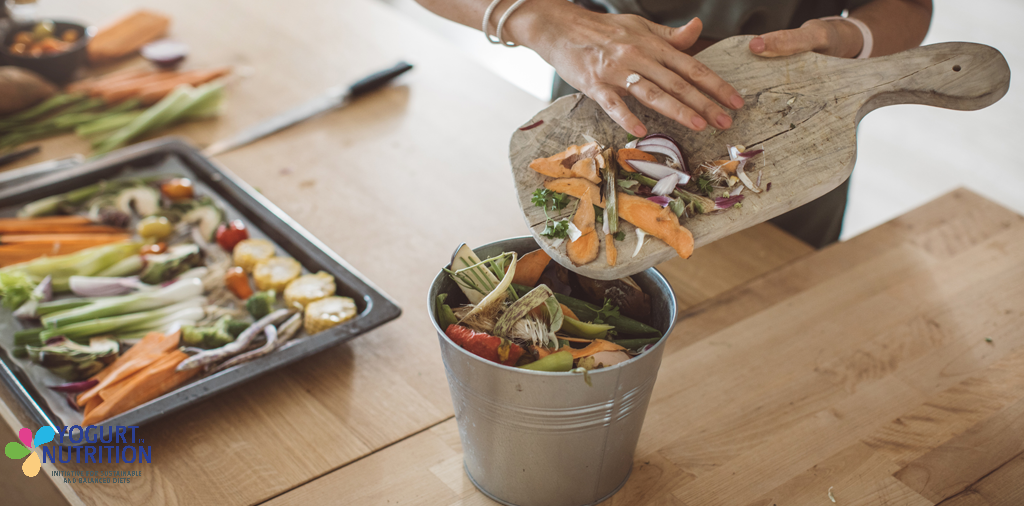The environmental and climatic challenges of the last decades have led many public and private actors to address the problem of food loss and waste. [1]
How to define “Food Waste”?
“Food waste refers to the decrease in the quantity or quality of food resulting from the decisions and actions of retailers, food service providers and consumers” according to the FAO (Food and Agriculture Organization of the United Nations) [2].
On a global scale, approximately one third of the food produced is not consumed and ends up in our garbage. In the European Union countries, this represents an average of 173kg of wasted food per capita and per year, [3].
“According to the UN, “If food waste were a country, it would be the third largest emitting country in the world. In other words: food waste emits more greenhouse gases than all single countries in the world except China and the US.” [4]
Food waste is a widespread phenomenon, occurring at many levels in the food chain production [5]:
- During harvesting
- In the processing of the agri-food industry
- Retailers, wholesalers and supermarkets
- Consumers (mainly households) and food service providers (restaurants, collective catering)
However, it is important to differentiate between food loss and true food waste: “The part of food that is lost from harvest to the retail level, but not included, is called food loss. The portion wasted at the consumer or retail level is called food waste” (FAO, 2020) [2].
Why do we consumers throw away food?
Households and consumers are responsible for 40 to 60% of food waste in Europe, according the OECD [1]. Most of the time, reasons for wasting food boil down to the following criteria:
- The food differs in color, shape or size from an optimal standard (especially fruits and vegetables that must respect size and weight categories to be sold in supermarkets). Therefore, it is removed during sorting actions or when choosing from a supermarket display [6,7]
- There is a widespread misunderstanding in “Use-by” and “Best-before” dates. In 2018, the European Commission has estimated that about 10% of the 88 million tons of food wasted annually by EU countries are related to date labelling [7]. As a consequence, tons of food are wasted every year because of this lack of information.
- Food is bought in too large quantity and cooked food often accumulate in the fridge after meals. Hence, we want to get rid of them to make room and sometimes, it is edible food with a valid use-by date. Around 20% of the food wasted has never been unpacked.
8 tips to reduce food waste at home
-
Check the “best-before” and “use-by” dates with a better understanding
 Use-by dates refer to food security whereas best-before dates are about food quality. On the one hand, food may not be safe to eat once its use-by date is past and can cause sickness for highly perishable food like meat or fish [7].
Use-by dates refer to food security whereas best-before dates are about food quality. On the one hand, food may not be safe to eat once its use-by date is past and can cause sickness for highly perishable food like meat or fish [7].
On the other hand, eating food past its best-before date remain safe, but it is not guaranteed that the texture, smell or taste will remain at their best [7]. Therefore, some foods can be consumed without any risk after this expiration date. Not only will it enable you to reduce you food waste, but you will also save money.
-
Store your food properly
Proper storage conditions prevent food to spoil too rapidly [7]. When you get back from shopping, you can put the products whose use-by date is approaching in front of the others in the fridge. The same goes for ripe fruit: you can put it on top of the basket.
Moreover, dairy products like yogurts, milk or fresh cheese need to be stored in the fridge as they can easily turn into development ground for bacteria and fungi. Store bananas, apples and tomatoes apart, since they can make other perishables spoiled easier. Have a look also at the storage recommendations on the packaging on how to store the food once opened.
-
Organize your food and meals
Organizing the meals for the week can be done according to the “FIFO” method: “First In, First Out”. To do so, pay particular attention to the use-by dates of products and foods, so as not to abandon rapidly perishable products in the back shelves.
-
Freeze your leftovers
You can freeze your leftovers in small individualized boxes, so that they can be re-used in a new recipe [2]. Many cookbooks and blogs now offer tips and advices adapted to reuse leftovers in simple and tasty recipes.
-
Plan your meals
By making a weekly menu, you will be able to go shopping with a precise list and avoid random buying in the aisles. Thus, you will make sure that all the products you buy will be consumed and your wallet will also thank you (we can save up to 100€ per year per person by being careful). In other words, shop only what you need!
-
Don’t be afraid to consume “ugly” fruits and vegetables
It is not because the color, shape or size is not “perfect” that the product has a bad taste. We are used to seeing very standardized food products, especially fruits and vegetables, yet products outside the esthetic categories are no less good. The less we leave them out, the more our stores will be ready to sell them.
-
Share your extra food with friends and neighbors
When you have extra food you won’t be able to eat and it is still healthy, there are many ways to avoid wasting it by throwing it away: ask around, friends or colleagues could make use of what you won’t eat. In addition, you can invite neighbors over for a meal when there is enough food to share! Eventually, check if there are food banks or NGO and associations in your neighborhood that accept donations: they will distribute them to people in need.
-
Compost your organic waste
It is easier to obtain nowadays an individual compost bin: there are some adapted to the life in apartment (vermicomposter), to more or less large families … do it at you own scale! By composting food scraps and peelings, which are organic waste, it is possible to obtain its own compost for gardening.
When we understand the environmental, economic and social consequences of food waste, it helps keep motivated! It may take energy and time not to throw away, but it worth it.

A cookbook and tips to help families reduce food waste
Dr. Jess Haines, laureate of the Danone International Prize for Alimentation 2020 is an Associate Professor at the University of Guelph, Canada. She was awarded last year for her research into promoting sustainable healthy eating among families.
Her team created in partnership with Guelph Food Waste Research Group, The Helderleigh Foundation, and George Brown College’s Food Innovation and Research Studio, the “Rock What You’ve Got: Recipes for preventing food waste” cookbook. The latter gathers many recipes designed to help families use their leftovers and ingredients from the fridge, in order to reduce food waste.
Feel free to download it on the Guelph Family Study website.
Sources:
[1] Bagherzadeh, M., M. Inamura and H. Jeong (2014), “Food Waste Along the Food Chain”, OECD Food, Agriculture and Fisheries Papers, No. 71, OECD Publishing, Paris.
[2] FAO- 15 quick tips for reducing food waste and becoming a Food hero
[3]Scherhaufer S, Moates G, Hartikainen H, Waldron K, Obersteiner G.O., Environmental impacts of food waste in Europe, Waste Management (2018); 77: 98-113.
[4] UN Environment Program Food Waste Index Report 2021
[5] Papargyropoulou E, Lozano R, Steinberger J. K, Wright N, bin Ujang Z; The food waste hierarchy as a framework for the management of food surplus and food waste; Journal of Cleaner Production, (2014); 76:106-115,
[6] Vivianne H.M. Visschers, Nadine Wickli, Michael Siegrist, Sorting out food waste behaviour: A survey on the motivators and barriers of self-reported amounts of food waste in households, Journal of Environmental Psychology; (2016); 45: 66-78
[7] EUFIC, Best before, use by and sell by dates explained
For more information:
· Resolutions for a sustainable diet: How to reduce food loss and waste?
· Resolutions for a sustainable diet: Sort your food related waste
· Infographic: Sustainable healthy diet: from science to your plate



